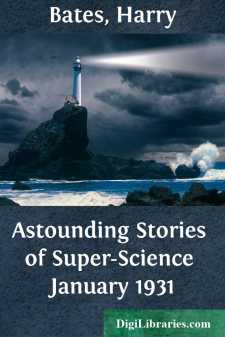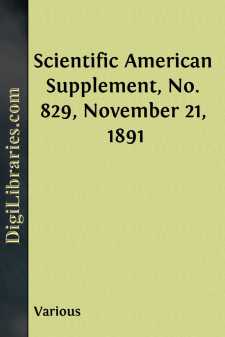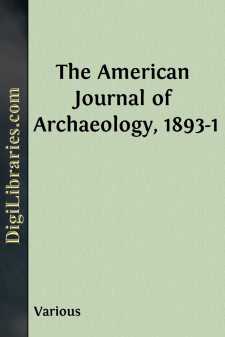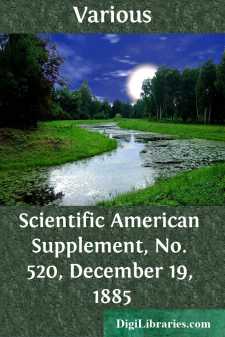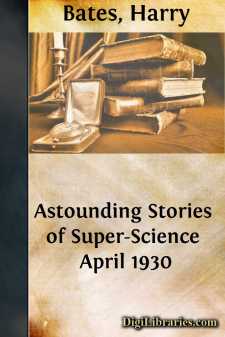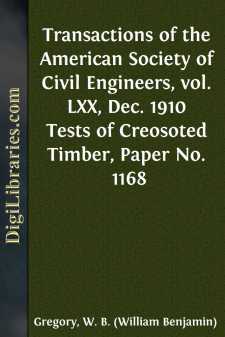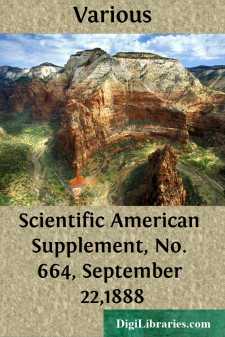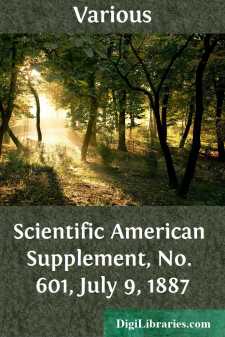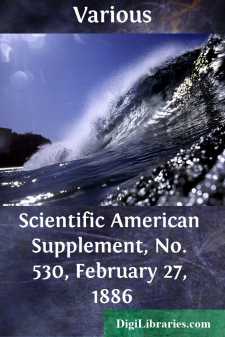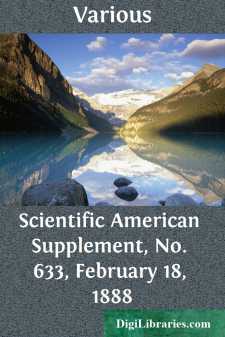Periodicals
- Art 27
- Children's periodicals 59
- Entertainment 5
- Food/Wine 2
- Games/Humor 455
- General 661
- Health 1
- History 53
- House/Home 1
- Regional 62
- Science/Nature
- Transportation 10
Science/Nature Books
Sort by:
by:
Harry Bates
An officer of the Special Patrol Service dropped in to see me the other day. He was a young fellow, very sure of himself, and very kindly towards an old man. He was doing a monograph, he said, for his own amusement, upon the early forms of our present offensive and defensive weapons. Could I tell him about the first Deuber spheres and the earlier disintegrator rays and the crude atomic bombs we tried...
more...
by:
Various
Science needed two thousand years to disentangle the earth's orbital movement from the revolutions of the other planets, and the incomparably more arduous problem of distinguishing the solar share in the confused multitude of stellar displacements first presented itself as possibly tractable a little more than a century ago. In the lack for it as yet of a definite solution there is, then, no...
more...
by:
Various
THE TEMPLE ON THE ACROPOLIS BURNT BYTHE PERSIANS. The excavations conducted by the Greek Archæological Society at Athens from 1883 to 1889 have laid bare the entire surface of the Acropolis, and shed an unexpected light upon the early history of Attic art. Many questions which once seemed unanswerable are now definitively answered, and, on the other hand, many new questions have been raised. When, in...
more...
by:
Various
WAGE EARNERS AND THEIR HOUSES. MANUFACTURERS AS LANDLORDS. Among the more prominent movements of the day for the improvement of the condition of the working men are those which are growing into fashion with large manufacturing incorporations. Their promise lies immediately in the fact that they call for no new convictions of political economy, and hence have nothing disturbing or revolutionary about...
more...
by:
Harry Bates
met the man who had died. A bitter, heart-numbing night of weird, shrieking wind and flying snow. A few black hours I will never forget. "Well, Jerry, lad!" my mother said to me as I pushed back from the table and started for my sheepskin coat and the lantern in the corner of the room. "Surely you're not going out a night like this? Goodness gracious, Jerry, it's not fit!"...
more...
TESTS OF CREOSOTED TIMBER. By W. B. Gregory, M. Am. Soc. C. E. During the last few years a quantity of literature has appeared in which the treatment of timber by preservatives has been discussed. The properties of timber, both treated and untreated, have been determined by the Forest Service, United States Department of Agriculture, and through its researches valuable knowledge has come to engineers...
more...
by:
Various
GUN PRACTICE IN THE FRENCH NAVY. The gunners of the French fleet are possessed of a skill which is recognized by all the maritime powers, and these picked men proved this at the siege of Paris, where they made themselves illustrious, not only by their courage and their coolness, but also by the accuracy of their firing. Nothing is neglected, moreover, to keep up the precision of hand and eye that...
more...
by:
Various
THE FALKE TYPE TORPEDO BOAT. Among the different classes of vessels designed for special services, constructed by Messrs. Yarrow & Co., at Poplar, for the British government, is one which is stated to be the fastest torpedo boat in her majesty's navy. This boat has been put through its official trials; with a load of 15 tons, running continuously for two hours without stopping, a speed of 23...
more...
by:
Various
HON. HIRAM SIBLEY. Hon. Hiram Sibley, of the city of Rochester, a man of national reputation as the originator of great enterprises, and as the most extensive farmer and seedsman in this country, was born at North Adams, Berkshire County, Mass., February 6, 1807, and is the second son of Benjamin and Zilpha Davis Sibley. Benjamin was the son of Timothy Sibley, of Sutton, Mass., who was the father of...
more...
by:
Various
THE COMPOUND STEAM TURBINE. Last year the whole of the lighting of the Newcastle Exhibition was effected by the agency of seventeen of these motors, of which four were spare, giving in the aggregate 280 electrical horse power. As the steam was provided by the authorities of the exhibition, it was good proof to the public that they had satisfied themselves that the consumption would not be extravagant...
more...


